
Yesterday Strava sent out an e-mail to users, outlining a change that’s occurring almost immediately, regarding 3rd party apps and the way apps are allowed to access and process data from Strava. All of these changes impact what is known as the Strava API (Application Programming Interface). That’s the piece that lets your Garmin watch push your workout to Strava, and then lets an app like VeloViewer or others access your data.
There are countless apps that use Strava’s API, literally tens of thousands according to Strava. Some of these are tiny, some of them are massive. Virtually every company in the space uses Strava’s API, including Garmin, Wahoo, TrainerRoad, VeloViewer, Xert, and plenty more. It’s become the defacto data hub for millions of athletes, some 100m+ according to Strava’s press release.
In any event, the e-mail Strava sent out, as you can see below, is pretty bland, and doesn’t really get into things:
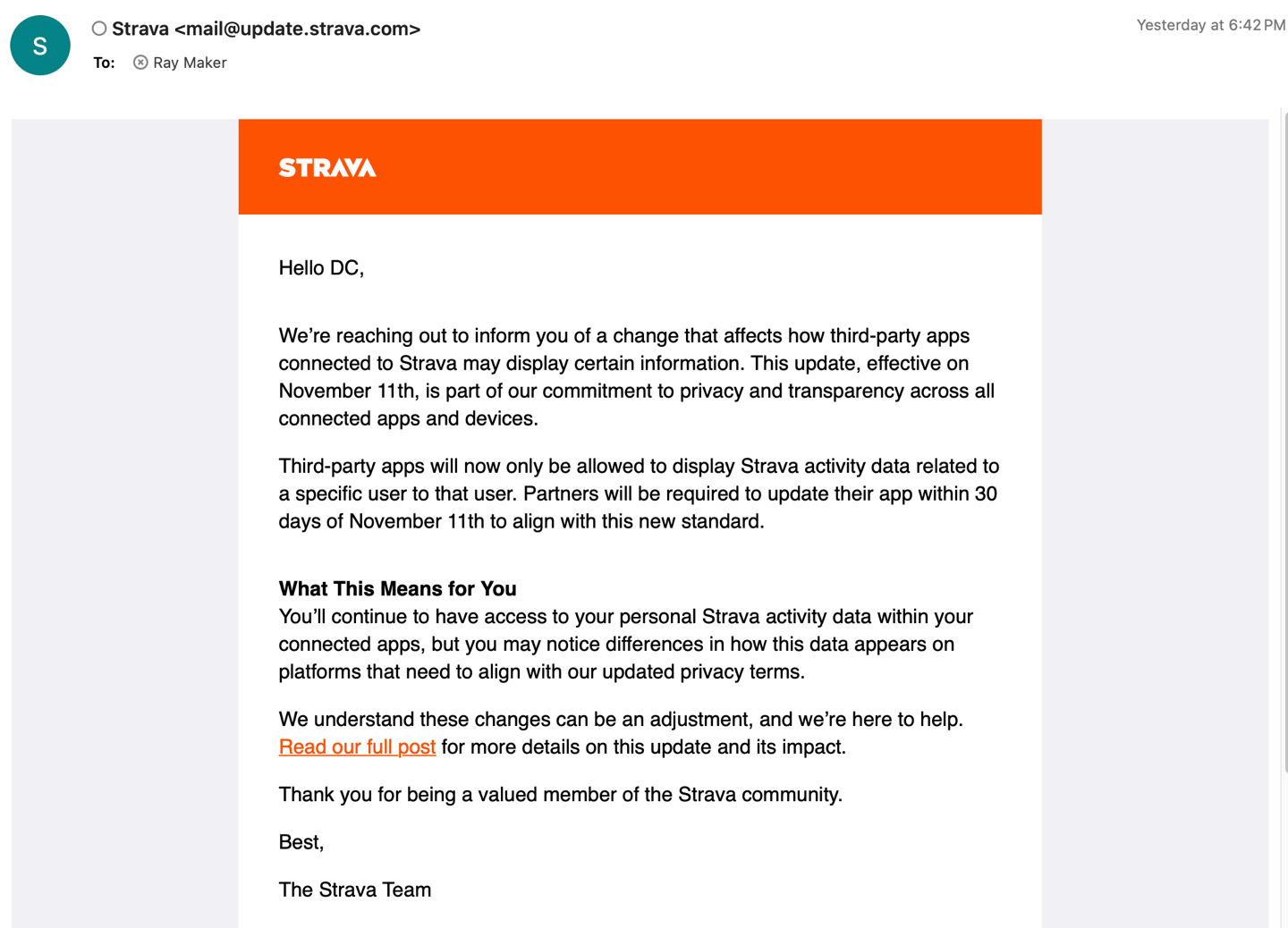
Instead, you need to crack open the included link to start understanding the implications. All of which roughly boils down to two main items (but a bunch of smaller things), there’s three biggies:
#1: “Third-party apps are no longer able to display your Strava activity data on their surfaces to other users.”
#2: “We’re updating our terms to explicitly prohibit third parties from using any data obtained via Strava’s API in artificial intelligence models or other similar applications.”
#3: “You may not process or disclose Strava Data…for the purposes of, including but not limited to, analytics, analyses…”
They also included language that apps are somehow not allowed to replicate Strava’s “distinctive look and feel”, which…ok. And more hilariously, they added that any users posting to their community hub forums that are “requesting or attempting to have Strava revert business decisions will not be permitted” and summarily deleted.
Said differently: Do not discuss the community things you don’t like in the community.
But again, the big three that matter here are:
#1: Apps can’t show your data beyond yourself
#2: Apps can’t use any “AI” whatsoever in their processing of your data
#3: Apps can’t do any analytics or data processing of your data
To understand how ridiculous these are, let’s outline some real-world apps you’re probably familiar with.
Breaking Coaching and Comparison Apps:
The first item (not showing data beyond yourself) immediately breaks almost all coaching apps that have connections to Strava. This includes apps like Final Surge, Xert, and Intervals.icu. These are apps that pull in your Strava data (as you requested) to analyze on your platform. For visual reference, this:
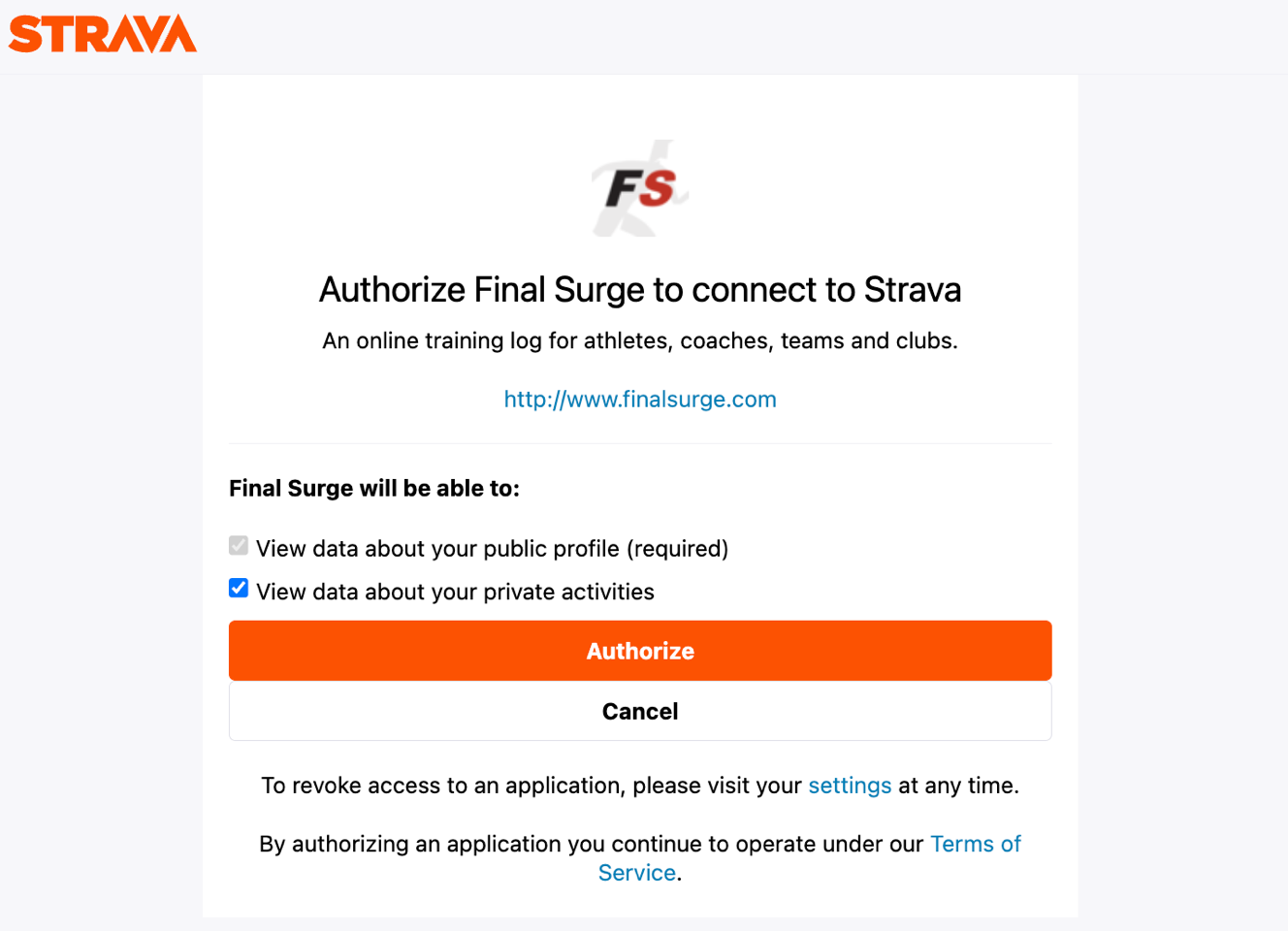
Now you may be wondering why they don’t just go directly to Garmin, Wahoo, etc… That’d be more effective, right? And indeed it is, and most of these apps do. Except there are literally thousands of device manufacturers out there, and many of them only connect to Strava.
Take for example the AmazFit T-Rex watch I’m testing right now. That doesn’t connect to Final Surge. Or Xert. Or TrainerRoad. Or much else. It does connect to Strava though, so, my data uploads to Strava and I’m done – off it goes to all my authorized apps. The same is true for the Google Pixel Watch. Or Samsung’s Galaxy watches. Below is a good example of how I can get all those data types into Strava.
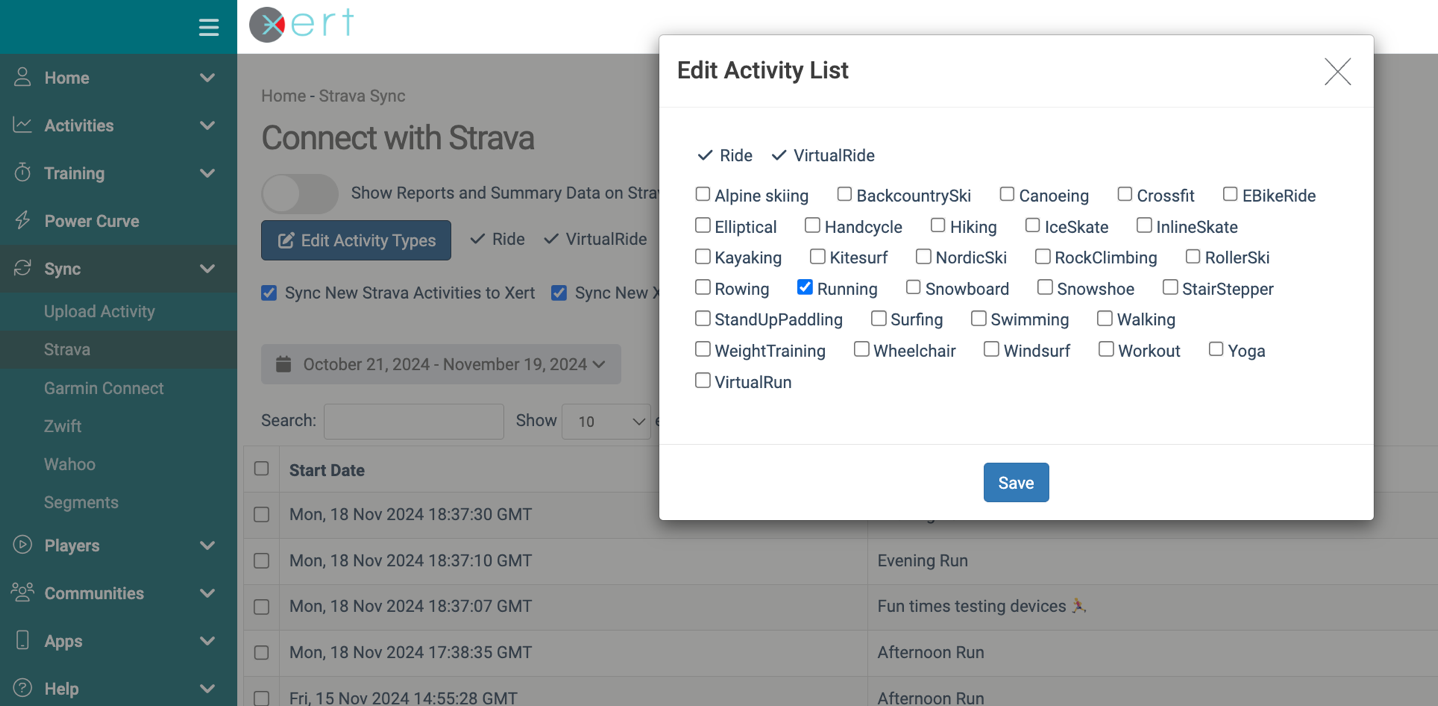
Strava benefits because they’ve become the defacto platform of choice for consumers. Companies benefit because they don’t need never-ending connections to platforms. And consumers benefit because everything ‘just works’. That’s the goal, right? Just working?
Well, not anymore.
With this change, apps that do any sort of coaching on their platform are not allowed to show the end users data to their coach. The new API terms and conditions explicitly prohibit this:
“you may not disclose such data to, or use it for, another user nor any other third party.”
In fact, the popular training and coaching platform Intervals.icu already posted this breaks all coaching features for them related to Strava data – requiring them to hide not only new user data going forward, but all historical data for coaches.
“Activities from Strava will soon only be visible to the athlete that performed the activity, not to their coaches or followers. This is a new addition to the Strava API terms and conditions.”
But it also breaks plenty of other apps that aren’t coaching apps – but merely showing Strava data. For example, apps like VeloViewer, which curates your lists of segments for deeper analytics and competition among groups, breaks. Same goes for all of their leaderboards for Zwift. Or their challenges. Or the listing of other people’s efforts (when you click on ‘View on Veloviewer’ from any of these below. All of it – going to be killed off if apps follow the letter of the law.
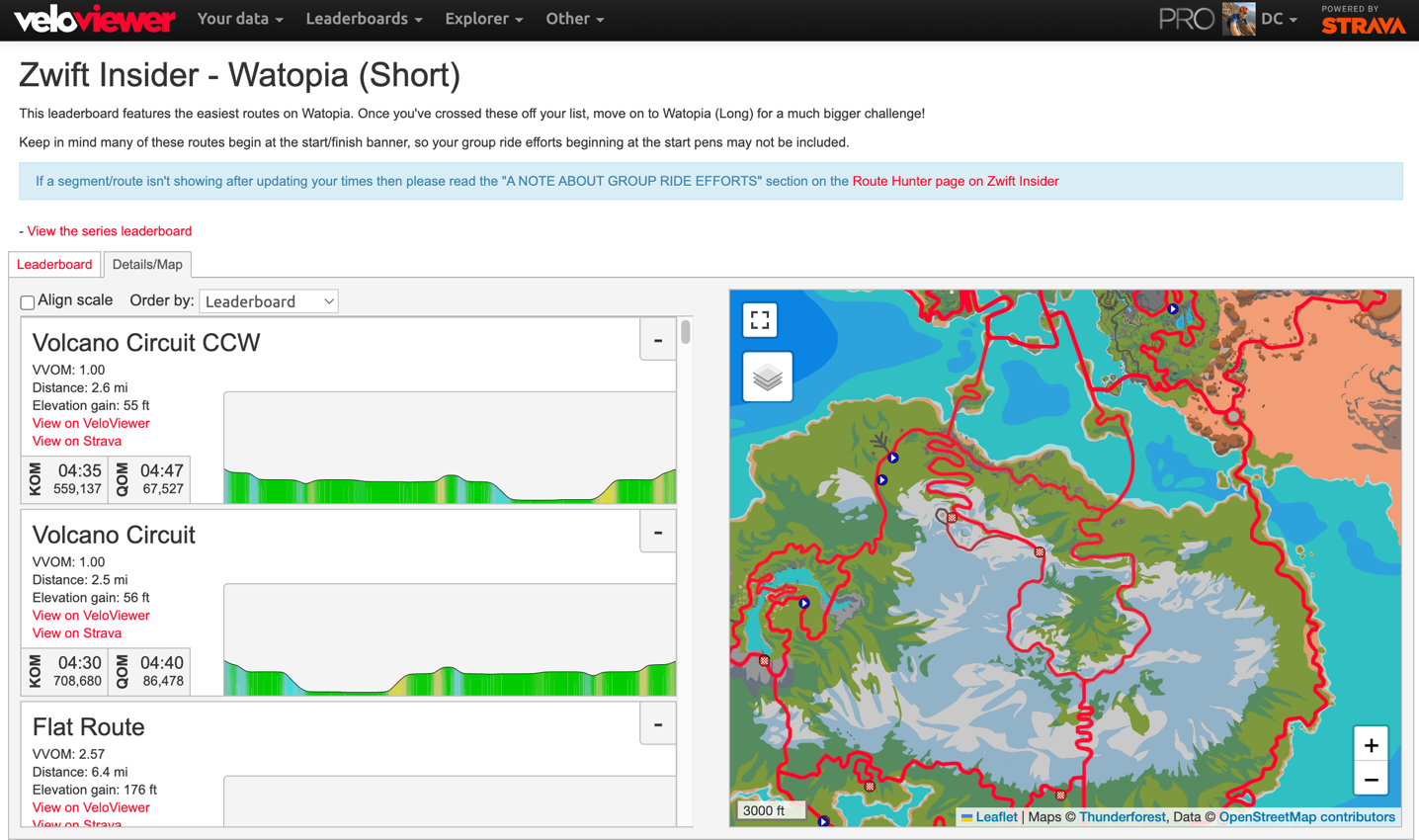
Like these details:

The challenge with these changes, is that practically speaking, unless you have a Garmin or other big-name device with a proper and well-documented public and easy to access API, all of these apps won’t set up connections to those device platforms directly. They can’t in some cases, and it won’t be feasible in most to service all of these app requests. Even seemingly big players like Wahoo, Hammerhead/SRAM, and Polar don’t have easily accessible APIs that scale well to the number of requests that are going to be required here.
No Analysis of Data Apps:
But wait, there’s more. Strava’s new API agreement also makes clear that you can’t do ‘year in review’ type summaries either. In fact, it actually says you can’t do any analytics or processing of the data:
“You may not process or disclose Strava Data, even publically viewable Strava Data, including in an aggregated or de-identified manner, for the purposes of, including but not limited to, analytics, analyses, customer insights generation, and products or services improvements. Strava Data may not be combined with other customer data, for these or any other purposes.
In fact, as one major app pointed out to me, the above paragraph basically says you can’t do anything with any data at all. While portions of the above entry existed in previous API versions, this paragraph has now been expanded to be more precise.
With the above line, you can’t do much of anything. You want to show a user how many miles they ran that week? Nope, not according to the letter of the law as that’s ‘processing’ for the purposes of ‘analytics’. You want to show them how hard their workout was compared to a year ago? Nope, can’t do that either, that’s ‘processing’ for the purposes of ‘analysis’. Want to create a heat map tile like VeloViewer has? Nope, that’s “aggregated” data for “insights generation”:
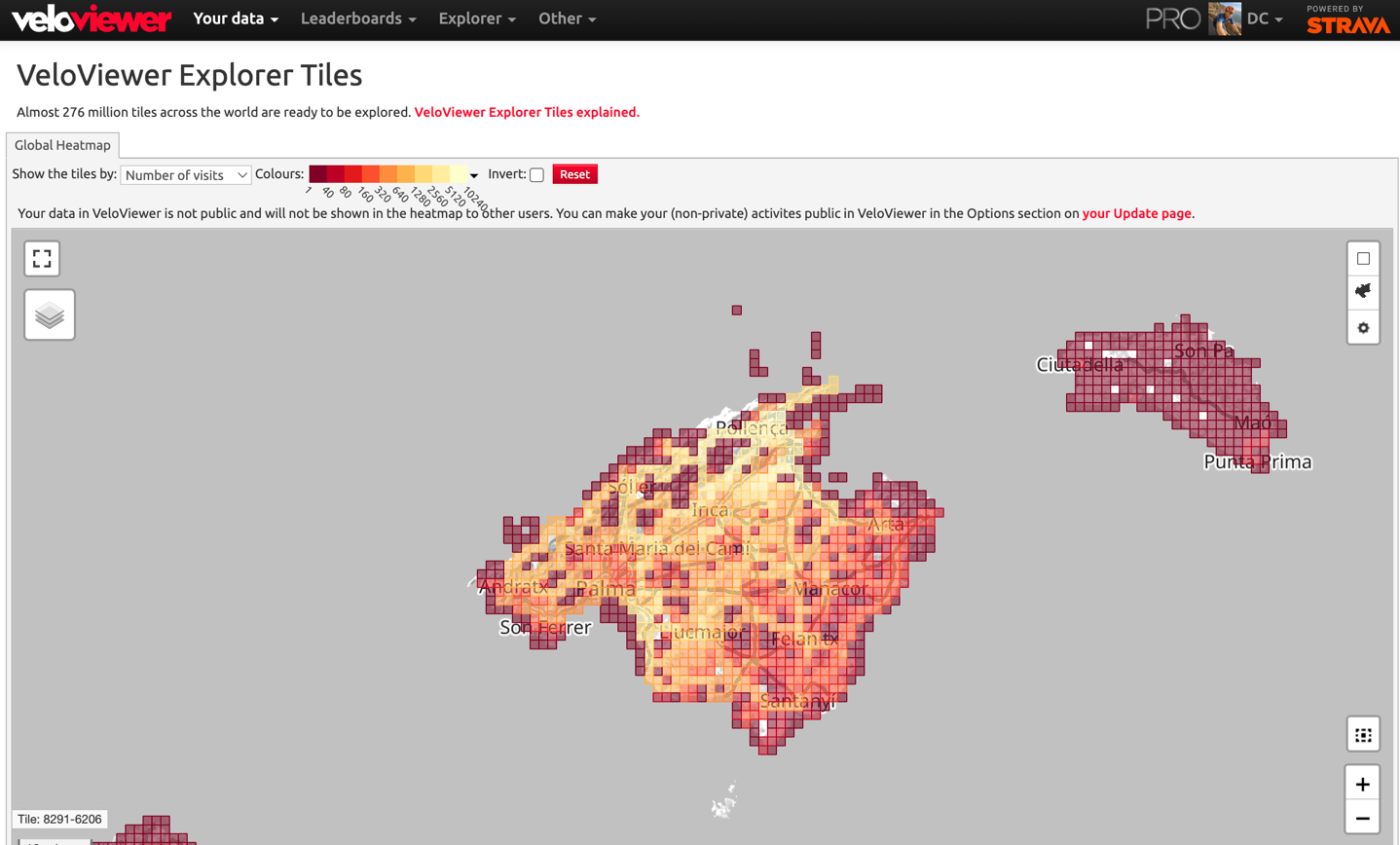
While Strava lawyers might try and say perhaps that line is there to prevent something else, any non-lawyer or lawyer would argue the opposite in court if they had to. That single paragraph basically says apps can’t do anything at all. Period.
The problem here is that Strava’s API terms are so broad and wonky now, that the API no longer serves a purpose, as stated by the above paragraph.
Nonetheless, I went back to Strava and asked them questions about many of these topics, trying to get clarification to see if this was a misunderstanding, they completely ignored the questions I had, and responded with:
“These changes were implemented to provide additional safeguards around our community’s data and to help ensure that a user’s Strava data can only be viewed by others on third-party apps in limited scenarios where sharing is both transparent and central to the functionality of the app. We recognize this is a change and are committed to working closely with partners during this transition.”
Point being, I gave them an opportunity to clarify things or set the record straight, and they said ‘nah’.
Add to that, they don’t seem all that committed to “working closely with partners”. As every single partner I’ve talked to over the last 24 hours has been completely broadsided by this change. They all received a generic e-mail Friday night, with a mere 30 days of notice to completely re-work their entire applications. Mind you, a 30-day period that includes the holidays (most companies would give at least 6 months of notice for something like this).
I suspect we’ll see a lot of companies just shut off the API entirely, and perhaps that’s Strava’s goal. Though, I fail to see how that benefits paying Strava subscribers, and thus Strava’s bottom line. Strava seems to be working very hard to kill off the community of tens of thousands of apps that arguably made it so popular.
No AI Usage & Analytics:
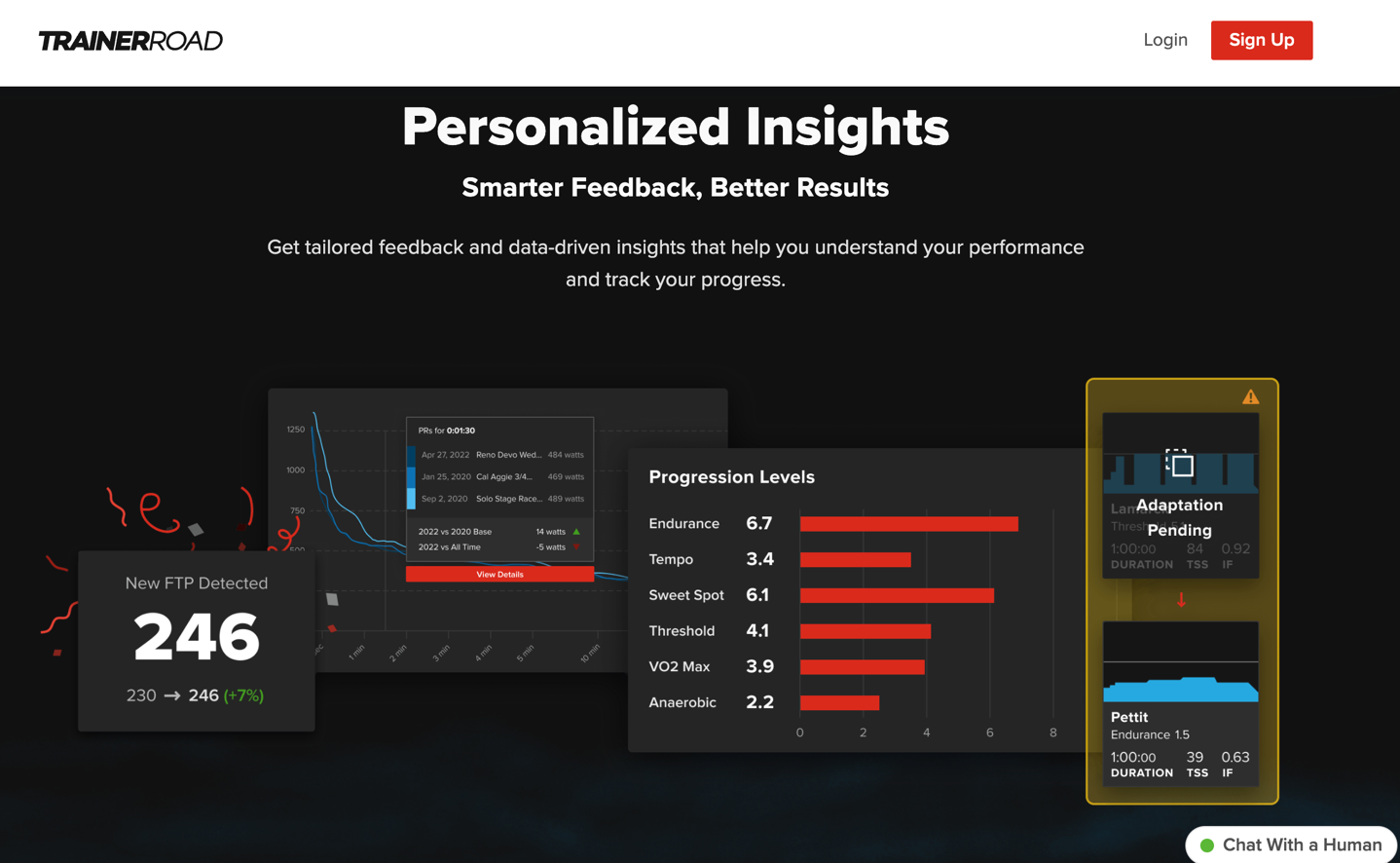
The next issue is just as crazy as the the others. It says that 3rd party apps may not use artificial intelligence processing in any way, for your data coming from Strava. Specifically, it stays the following:
“You may not use the Strava API Materials (including Strava Data), directly or indirectly, for any model training related to artificial intelligence, machine learning or similar applications.”
Of course, the term “machine learning or similar applications” basically means “you may not do any processing at all” on it, especially when combined with the above ‘no analytics’ clauses.
This particular line item immediately kills apps like TrainerRoad and Xert using data from Strava, but also countless other apps that pull in your own workout data via Strava, and then use some sort of processing to analyze it. Machine learning is hardly new or fancy. And putting in there “similar applications”, what on earth does that mean?
TrainerRoad and others use “AI” (however they want to define it), according to their marketing, and thus, in less than 30 days, they’ll have to cease their entire platform, or, disconnect Strava.
In the case of platforms like TrainerRoad, I suspect they’ll simply disable Strava altogether, and force everyone through direct connections. This will be fine for Garmin users, but as of right now there’s no inbound connection for Wahoo users (though that’s coming). And for people pushing Zwift workouts to TrainerRoad, that too will break until TrainerRoad completes their API connection in January.
But that won’t solve the larger issue TrainerRoad and other companies face, which is having to pull in the other 3rd party workout data types. TrainerRoad doesn’t have a connection to Suunto. Or Polar. Or AmazFit. Or Google. Or Fitbit. Or…I could do this all day. Strava solved that, to the benefit of both consumers and all companies involved.
Now Strava seems to want to own the “AI space” with its always-helpful AI insights that simply re-word my activity titles and tell me something vaguely positive but usually wrong.
Update from Strava (Nov 19th):
After publishing this post and video, Strava has issued an update in response. Note, they didn’t reach out or respond to me with the text, but did respond to The Verge where the updated text was originally issued, before publishing it on Strava’s own newsroom site. The Verge e-mailed me the update with permission to use, prior to Strava’s posting. Here’s the full text of the update:
Updated on Nov. 19
We wanted to provide some additional context around the changes to our API Agreement and the impact for our users and developers. We currently anticipate these changes will impact less than .1% of applications and proactively notified the majority of those affected last week.
Enhanced Privacy and User Control
Privacy and user control are at the forefront of our platform. As a result, we are committed to evolving our API practices as regulatory requirements and user expectations shift. This includes the decision to limit the ability of a user’s data to be displayed by third-party apps in ways the user may not expect. Specifically, we want to thoughtfully address situations where users connect to a third-party app and are unaware that their data is being surfaced not just for their own use and visibility, but also to other users (for example, in a public feed or heatmap). The latest API changes address this scenario and provide a more consistent framework for Strava user data.
Training AI Models
We believe in the potential of AI to transform the athlete experience–whether it’s delivering more personalized insights to help you reach your goals, generating route or training recommendations, or countless other possibilities. But innovation in this space must be handled responsibly and with a firm focus on user control. As part of our generative AI features, we are committed to implementing thoughtful solutions that prioritize user control and the ability to opt out.
Third-party developers may not take such a deliberate approach to training AI models and as a result, we believe the best decision for the platform and for users is to prohibit the use of data extracted from Strava users in this manner. Our previous terms already disallowed the use of Strava user data in model training and development but we’ve made this more explicit in light of the increasing activity in this space.
No Impact to Most Developers
We recognize that our platform thrives because of the creativity and dedication of third-party developers who build tools to complement and extend Strava’s capabilities. We are steadfast in our commitment to fostering this ecosystem. We anticipate that these changes will affect only a small fraction (less than .1%) of the applications on the Strava platform–the overwhelming majority of existing use cases are still allowed, including coaching platforms focused on providing feedback to users and tools that help users understand their data and performance.
Collectively, these changes reflect our commitment to ensuring that Strava remains a trusted platform for athletes and developers alike. That means holding ourselves—and anyone building on our platform—to high standards.
However, ultimately, it doesn’t actually change things – in fact, kinda doubles down on it. In it, Strava basically says three things:
A) 3rd party apps can’t show data beyond the user itself. Just as before, this still breaks coaching apps. Strava tries to confuse people by saying “the overwhelming majority of existing use cases are still allowed, including coaching platforms focused on providing feedback to users and tools that help users understand their data and performance.” – however, what they’re actually saying is 3rd party coaching apps can provide feedback, as long as that’s computational feedback. Coaching apps still cannot let human coaches see the data. Had that been the case, Strava would have simply said that, and notified coaching apps. They’ve done neither, and multiple coaching apps I’ve talked to have confirmed Strava hasn’t changed their position, but has scheduled meetings to talk about the impacts.
B) Artificial Intelligence and Machine Learning is still prohibited. Again, Strava tries to keep distracting people by saying “training models” is not permitted. Yet the terms are very clear, both training and usage isn’t permitted. Still, as any company can tell you, even if it were just training (which again, it isn’t), these models can’t get better without training on the same data for whatever application purpose they are using. After all, last I checked, Strava themselves doesn’t give us permission to allow/deny their access to our data for AI training purposes.
C) “No impact to most developers” – In the update, they say “We anticipate that these changes will affect only a small fraction (less than .1%) of the applications on the Strava platform”. Except, that’s the most disingenuous way of writing it. Strava has tens of thousands of connected applications, the vast majority of which are tiny hobbyist applications that may have 1 user or a handful of users. Instead, it’s the big-ticket applications that matter here with the most users. Strava isn’t saying 0.1% of users, just 0.1% of applications.
–
Ultimately, it seems like Strava’s API itself needs an update if Strava believes users need more control. And to be clear – I’m 100% behind giving users more control. Strava could easily add check-boxes for “AI data usage” and “Show data publically” to the 3rd party platform API authentication dialog (just like they do today for other features). They could easily require 3rd party developers to ensure consent (just like they do today for other features). And they could easily require developers to adhere to various rules (just like they do today).
Going Forward:

Based on these API terms changes, I don’t see how any apps can leverage Strava data going forward. Especially with the specific line item of “You may not process or disclose Strava Data, even publicly viewable Strava Data, including in an aggregated or de-identified manner, for the purposes of, including but not limited to, analytics, analyses, customer insights generation, and products or services improvements.” – that’s fundamentally what any app does: It processes your Strava data and provides some sort of analytics.
Perhaps Strava will try and argue otherwise. In fact, I e-mailed them last night asking them to clarify these very questions, since these seemed pretty broad and impactful. The response was nothing more than sending me to the already-existing page about the API updates.
I feel at times that Strava wakes up each morning, heads to work, looks out over the San Francisco Bay from their offices, and asks itself: How can we anger our users and partners today? How can we make everyone’s life more difficult today?
Every time Strava does something good (such as last week’s night heat maps), they immediately go and ruin that good love with something to upset their user base. And obviously, that’s their prerogative as a company. But it just seems that no company in the sports tech space spends as much time and energy proactively trying to anger their users as Strava does.
I go back to Strava’s new CEO in his keynote address at Camp Strava this past summer (7:22 in video), where he said:
“If you envision the whole active community, along with the connected fitness industry as sorta like one giant cycling peloton…then Strava should be leading the way. We should be your lead-out rider, blocking the wind, creating a slip-stream, helping the whole peloton move faster, and more efficiently.”
I’m unclear on how these changes fit with that recently announced vision.
Ultimately, I use and significantly enjoy the core of Strava as much as most other people. I’m on the platform daily. But man…c’mon Strava, just do better.
FOUND THIS POST USEFUL? SUPPORT THE SITE!
Hopefully, you found this post useful. The website is really a labor of love, so please consider becoming a DC RAINMAKER Supporter. This gets you an ad-free experience, and access to our (mostly) bi-monthly behind-the-scenes video series of “Shed Talkin’”.
Support DCRainMaker - Shop on Amazon
Otherwise, perhaps consider using the below link if shopping on Amazon. As an Amazon Associate, I earn from qualifying purchases. It doesn’t cost you anything extra, but your purchases help support this website a lot. It could simply be buying toilet paper, or this pizza oven we use and love.

















They are asking for Outside // Trailforks to move into their territory
Achieving the ubiquity of industry leaders like Strava remains an ambitious goal, we (HuOpt) are hopeful to offer value in some of these similar areas. While we are not focusing on trails and navigation, we are hoping to close gaps around fitness and longevity. This vision centers on fostering an open ecosystem where users can connect diverse tools and datasets, enabling deep insights, personalized performance optimization, and collaborative advancements in sports science.
Ultimately, with many apps available to the public, hopefully everyone can find the one that benefits them personally the most.
Worst. Case. Scenario.
So, seems it’s time to cancel premium to give them a nudge that we’re unhappy about this.
And discuss it widely in the community.
Merry Christmas everyone!
STRAVA it’s my data … let me use it how I want ! Time to switch to another app …
I kind wrote it here several times… they are not saying it is not your data, what they are saying is that they will not allow others to pull this data via API interface. I do not like, because I use apps that depend on this interface and some of my data cannot ve sent to those apps any other way (Apple Watch data). But I am afraid we will have to accept that Strava (and no other company) is obliged to provide/maintain any API interfaces. Iay also very well decide to cancel my subscription if they really break the integrations which I use and I will be angry with them. But… it is their right to male their product to be worse and this lose customers.
They are saying we don’t have the right to do whatever we want with our data we are paying them to host. Implicit in that is they think they own our data and can tell us what we can and cannot do with it. But they are free to violate our privacy and monetize our data any way they see fit in addition to us paying them for the privilege.
I guess I’m one of the lucky bastards collecting data mostly from Garmin, and syncing to Strava. I wear a Fenix 24/7, so I get lots of data in my Garmin app. And I’ve been with Lezyne some years ago because of the maps and batterytime, but now I’m on Edge :)… and I have a Wahoo trainer too. Garmin takes my workouts into account for my condition/status without needing power meter data, it even recognizes my bike rides to work. So my rest/train status can be monitored more accurate through Garmin. Why would I keep paying for Strava when they don’t get better but instead get more limited? I won’t renew my subscription if this BS holds, like I left Garmin until they came to their senses,,,
The creators of some of the possibly affected tools had their round of calls with Strava and posted their first updates.
Intervals.icu will survive and will be able to show data to coaches, but not to followers: link to reddit.com
Wandrer.earth is struggling with the request of not showing personal maps to other users and it looks like it will build alternative ways to upload data to it (Garmin etc). Their reasoning and possible solutions were rejected by Strava. link to strava.com
Statshunters is in the clear: “Your application has not been identified as being in violation with our updated API Agreement. No action is currently required.” (posted as a comment here: link to strava.com )
I am dating myself but their leadership sounds like the old sears and roebuck. They would take a good concept and ruin it. These tech companies seem to have the same playbook and the customer isn’t in the center. Oh well just. Continue to be loyal to Garmin.
Now is the time Garmin…
Make Connect truly device agnostic and pave the way for a migration.
Or, given a more altruistic approach, the hardware manufactures create some form of common or at least data cooperative API set for all their fitness products. #wishfulthinking, I know.
Strava has become the defacto central repo for many, not out of merit but serendipity, rather as VHS did. It has rested on its laurels by failing to innovate nor add enough extra value for paying subscribers. Shareholders want more and it is now thrashing around trying to satisfy them whilst (unsuccessfully) trying not to alienate users. It’s value is It’s mass of data (and serving this must cost a lot) so it needs to get value from this. It may wish to provide tailored adaptive training using its big data and AI in which case blocking competitors makes sense. They do need to be more up front and communicate their plans better.
It does rather create an opportunity for another device agnostic repository who’s business model is to be just that whilst selling access and providing APIs to third parties. We don’t really need tons of duplicate data on lots of different proprietary servers. It wastes energy and warms the planet.
Over twenty years, I have used many platforms (with many years of Garmin). After trying for a while, I managed to consolidate all those twenty years into Strava. My current activity syncs there through Zwift or Apple Watch. None of my activities originate in Strava. I pay my subscription more to support their work than for the added features.
While I do not extract my activities anywhere, so this change does not really impact me, I am completely against it as a matter of principle. I have canceled my subscription today. I have a few more months left. Now, I am open for ideas on how to extract those twenty years of my activities and go somewhere else.
Rungap!
You could transfer your data to Golden Cheetah, it imports workouts automacilly from Strava
It’d be interesting to see an antitrust analysis of this. If Strava can be said to hold market power in a distinct product market – say, aggregating athletic performance data – and all of a sudden decides to stop playing nice with others in the marketplace over which it has substantial control, to the detriment of consumers, that’s exactly the sort of behavior that draws antitrust scrutiny. And if they think there aren’t any Strava users who work in DOJ’s Antitrust Division or the FTC, they’d be wrong.
It’s not the kind of behavior that draws scrutiny from US enforcement authorities, for a number of reasons:
– That’s a sketchy market definition that would be difficult to prove.
– Even if you prove it, proving market power would be difficult.
– Even if you prove the market and market power, that STILL wouldn’t impose a duty to deal with competitors (see Verizon v. Trinko).
– Although not technically an antitrust requirement, under rule-of-reason analysis, you generally want to show that the defendant is “abusing” market power. In other words, they’re not just being unreasonable and unfair, they’re specifically TRYING to harm competitors so they can take their market share.
– Finally, and most significantly, DOJ and FTC allocate their enforcement resources partly based on the economic impact of the challenged conduct. Strava is a small company and this is a small market. The enforcement authorities will go after small fish only when they’re doing something that’s unambiguously illegal. They typically only do difficult cases when the stakes are really high.
Helpful analysis! Except! DC says they’re trying to kill off apps, so there’s your intent!
Saw this on forums.intervals.icu (in attached screenshot as well)
link to forum.intervals.icu
I have just had a call with Strava about the changes to the Strava API terms and conditions, specifically the requirement to only show Strava activities to the athlete who performed the activity.
Strava’s intention was to avoid the situation where someone grants access to their data to someone else (e.g. accepts a follow request on Intervals.icu) and then forgets about it leading to privacy problems much later.
The intention is not to prohibit coaching relationships. So intervals.icu can continue to allow coaches to see their athlete’s data from Strava on Intervals.icu.
So soon your followers will not be able to see your Strava activities but your coach will. This is a great outcome for everyone being coached on Intervals.icu and for coaches using the platform to manage their athletes.
I would not bet my business on a phone call that says to ignore the actual words in the API T&Cs. It would have been incredibly easy to carve out sharing with express user consent for coaches. They did not do so.
Just cancelled mine….
No one wants to pay for anything and yet nothing is free, once you get your head around this then we can all make smart decisions. We started focusing on hardware, as this developed the software on the hardware, and left the actual software to last. Now that data is so valuable the model is being reversed and we are stuck.
Strava is a strangle point for data due to its universality, yet they do not know how to monetise this. They would have been better off buying smaller apps using Strava data and including them in their premium offering instead, that would have been a better of offloading development costs risks in my view.
I pay for Strava and very often I also pay for another apps, which are using Strava API and I’m not the only one.
Strava could just set a reasonable price for developers using their API and I think that would be fair game for everyone and also much simpler solution for everyone.
Totally agree! And as I wrote somewhere above: I think this is yet to come. They have now scared the community and then they will turn to be heroes saving us. API usage will be for subscribers only and price will increase by 50% or so. And we will love them for this move. But do we have much other options?
@MarekBns: I think there are many other options but, sadly, the social aspect of Strava is what keeps people from going somewhere else. It’s like with every other social platform: “I know that they are doing bad stuff, but I don’t want to go elsewhere, because all my friend are here”.
I have canceled my sub and disconnected all sources that fed Strava with my data. Keep the account for now and I see how the things go from here.
2 observations:
#1: when Strava actually pulls this off, restricting 3rd party use of data…..I’ll not be surprised seeing others like Garmin, etc going down the same path.
#2: Device makers that have no own dataplatform but rely on Strava will have an even larger competitive dis-advantage than today.
Very sad to see. As a software developer by profession I had a few personal tools that were using the strava api and in some cases (because the api was lacking) also logging in directly to strava as a browser would to manage my personal activities.
I had always hoped strava would at some point find a bit of time to improve their API and add those features I was missing, but this is quite the opposite, after this they will have much less incentive of improving their API, as it will be used less.
PS: Ray did you remove my previous comment? I can’t seem to find it. Sorry if it was offensive in any way.
To shine some positivity on the world of APIs in the fitness realm, Oura have a fantastic API. It is well documented, and it covers everything that the ring measures. You also can just register to use it without any hoops to jump through (looking at you Garmin).
Just look at this documentation to see what I mean:
link to cloud.ouraring.com
I would love for other companies to put some efforts into their API, it is a very nerdy topic and 99% of the users don’t use it, but I think that 1% that does is a very powerful component, and giving the ability to realize really cool ideas or additional insights/features is something that results in a better world for all of us – e.g. the 99% might have fun using a tool like VeloViewer
Xert has posted a comment to its forums indicating that it is unaffected by Strava’s new policies – which seems odd given Strava’s broad language and Ray’s interpretation of that language.
We so need a direct competition for Strava.
I don’t think their goal is to prevent all those partners from connecting to their platform but rather to pretend they did something when this will have dearer consequences: link to lemonde.fr
link to edition.cnn.com
Did Garmin just secretly slip roofies into the catering at a Strava board meeting, or surreptitiously buy part of Strava? It seems such an absurd decision. Unless some outside influence is involved I struggle to think of any other reason than tech bros in a bubble believing their own fantasies.
“Now Strava seems to want to own the “AI space” with its always-helpful AI insights that simply re-word my activity titles and tell me something vaguely positive but usually wrong.” 😂
Nice summary of Strava AI. I am glad I am not the only one thinking that.
Guessing TrainingPeaks was tipped off on this to spur their acquisition of IndiVelo…
Not surprised to see Strava try to adopt a form of the reddit playbook but unfortunately for them they are in too weak of a position.
What will Strava do if Garmin and the rest make Strava pay for api access. If they don’t make enough when their data inputs are free, wait until they aren’t.
Just cancelled Premium.
Didn’t really use Strava much, just to push data to other apps.
Hope Garmin will take that role from Strava.
I use humango which is an AI training app and ive gotten so much stronger since using it, if this kills it I would be really upset.
I just cancelled my Strava subscription, after 5 years.
And I started exploring the Garmin Connect social features. They keep getting better.
Let my premium subscription expire and then went into settings and removed the checkmark to allow @Strava to use my data for their own analysis.
For what it’s worth my subscription is cancelled and my full data requested. Let’s hope lots of us do that and they get the hint. I think the subscription is useless anyway, but having being there since 2012 it was a way to show some support. Enshittification at it’s best, not with my money, sorry.
I use Golden Cheetah. All of my info is stored on my PC. Goldencheetah can be expanded with Pyton and R. I switched from Polar to Garmin and lost no data.
Just deleted Strava account
While I agree with your skepticism here, it feels like you’re overreaching. Strava seems to have made a couple of attempts to clarify that the impacts will be limited. It’s unfortunate that they couldn’t state this more clearly to begin with. Certainly a bad communication job. They might want to put some effort into clarifying their goals and principles, which then might help understanding of the sort of rules changes they’re planning here. We are probably not looking at the demise of VeloViewer, etc. At least that’s my hope!
Problem is not only communication (which has been poor), but that the little that Strava is saying is quite inconsistent with the actual legal terms. Strava’s statements make the situation sound a lot more palatable – but, of course, these statement are legally binding, while the T&Cs are. Also who says that Strava will not (continue to) change it claimed position on this.
Agreed, but these are all communication problems. Anything they say carries legal weight. For sure there is some damage control needed here.
Disagree. Their press releases/PR statements carry little if any legal weight. Ultimately it comes down to the legal T&Cs – and those are not (just) communication, but contractual terms that parties can sue over etc Big difference!
I mean, apps have already said they’re hosed after 1:1’s with Strava (including some massive apps not yet reported here or elsewhere).
Some other apps, inversely, have gotten the OK from Strava, in direct conflict with previous statements.
IT’s definitely not overreaching, and every company – even the ones that have gotten OK’s agrees. Every company that’s gotten an OK that I’ve talked to seems to think it’s less because Strava says it’s OK, but more because Strava just doesn’t understand what the app is doing in relation to the T&C’s.
And once these terms are in the legal agreement Strava can use them at any point in the future to kill any app they want for business reasons (or whatever reason they want) and that has nothing to do with technical or privacy reasons that they hide behind, see what they did to Relive a few years back, so it’s not just some imagined threat, Strava has done it before. So even if they don’t enforce everything in the new wording right away it’s a ticking time bomb, ready to be used at any moment.
Of course the T&Cs can be changed at any time, so this is always a risk. Anti trust seems like an interesting question. I guess I was trying to be hopeful.. I recall and was impacted by the Relive mess. Sigh. I’m also familiar with Strava seeming to not understand how their product is used, or how to meet their objectives with minimal harm.
If this is as bad as projected, it’s bad. I’m with you on that.
Relive is still there. In my case it gets my tracks from Garmin Connect directly now. And Strava’s Relive “replacement” is as pathetic as their AI. Strava seems to hurt itself more than it hurts others. We’ll see about this time. So far I haven’t gotten any dire warnings from any of the apps I have connected to Strava, but it’s early.
Agree Ray. Even though veloviewer says they got the okay as long as they request frequent consent. And if that was their standard TOC, I’d have no issues with their change around visibility.
However until Strava changes the TOC, then they’ll just revert their consent at some point. Similarly, Strava doesn’t give me control over my data with their training, why shouldn’t others have the same rights?
I hope you are doing an update post at some point.
A few developers have provided updates about these policies after taking to Strava.
To me it seems the rules are quite random and not consistent between apps.
They certainly haven’t made it less of a mess.
Yup, definitely an update post coming.
There’s a big really big partners that are going back and forth currently with Strava, and the US Thanksgiving holiday is slowing things down slightly.
Not sure if I missed it, in that case I apologize: has there been an update to this story?
Has Strava changed anything in their attitude?
I cancelled my premium subscription because of their decision, was willing to understand if they did any step back.
The very broad ““You may not process or disclose Strava Data…for the purposes of, including but not limited to, analytics, analyses…” seems to have been removed in its entirety and replaced by a paragraph “Training AI Models”.
Ben (Veloviewer author) posted that they will need periodical re-affirmation of publishing your stats instead of the only-once affirmation but no other changes.
Veloviewer seems to get special treatment with strava api changes. For example, years back leaderboards were removed from the api for privacy reasons Strava said…except veloviewer got a pass, so privacy is important unless strava says its okay? Hmm
Other apps do not seem to have been so lucky with this api change either.
For my rowing I use a Waterrower with a Smartrow powermeter. Smartrow is a fairly small company but has close ties with Waterrower who have been in business for many years. Now Smartrow currently ONLY has a connector with Strava to feed the data into so I contacted them about the change at Strava and asked them whether they are considering adding connectors to for example Garmin Connect. Their response: We would LOVE to build more connectors to different platforms, however the likes of Garmin do not open up their API to small companies like Smartrow. So this basically means I’m snookered. Smartrow can only feed into Strava, but Strava doesn’t allow any export to analysis platforms. Long live the connected world…
SmartRow exports to Garmin Connect. Jusrt export file and manually importi to Garmnin
Hi Zest, thumbs up indeed manual download/upload is possible, however automatic like it does with Strava is not possible as Garmin has not opened up their API to Smartrow.
Are there any alternatives to Strava as a data collecting hub? Ideally I would like to have something that I could run myself in order to have control over my data but I guess that I would be hard to integrate with some, maybe most, services.
I stopped using Strava years ago. It’s a bag of wank and has been for ages.
So basically, a platform that was supposed to bring people together, is now shutting off everyone to everyone else and narrowing it’s usefulness.
Great. We’ll done to the brain dead morons at Strava. There’s nothing more satisfying than seeing a company get big headed and then crash and burn.
Can’t wait.
Don’t like how it affected Trailforks. Cancelled my Strava subscription
A few things you can do to tell Strava what you think about this.
1/ Cancel your premium subscription. Why give them money if they are not giving you anything useful? For me the data aggregation and being a sport data hub/broker was high on my list of reasons I kept paying for the last 12 years. Not anymore
2/ Download your entire dataset. This might give them a signal
3/ Deny them to process and store health data (Settings / Data Permissions / Health Related Data)
4/ Opt out of using your data for their Metro and other services (Settings / Privacy Controls / Aggregated Data Usage). Come on. They don’t allow third-party to display my data the way I want, but they can sell my data? No more.
5/ Stop using Strava! Don’t upload new data, or better yet, cancel your account. It’s the hardest part, as all my friends are there and there’s the social aspect. I am not ready yet for that.
Unfortunately none of this will make any difference as I suspect the number of people who care about the API change is infinitesimal compared to the overall amount of Strava users, even just the incremental daily new users they get. Strava will be fine. Who will *not* be fine are the small app developers who might have to close operations.
I’ve changed my name to Deleted Strava, disconnected my Garmin and removed Strava from my phone.
Was good while it lasted.
Bye Strava. If more people would do this, they’d wind their neck in.
The Wahoo API is due any day now…. Oh wait, that was the status update from 2017.
It’s sad none of the Strava competitors have just replicated Strava’s API (being careful not to also accidentally replicate any of their very “special” look and feel…). There’s a big market out there for a reasonably priced Strava alternative that works with all these now broken platforms. I think I’d almost pay to get rid of Strava at this point.
Isn’t intervals.icu a public API and it connects to just about everything.
link to intervals.icu looks great but it is a different API. I’m specifically thinking of a drop-in replacement for Strava. Minimum work for devs and minimum downtime for users.
One of the things I learned about Hammerhead is how much they assume people will sync with Strava so Hammerhead doesn’t have to build anything. That’s now a on starter for me since I dumped Strava. Just put my Hammerhead on Craigslist and ordered another Garmin.
Well my Oura ring now is not getting activity data from strava and now thinks I have become a couch potato. That total activity tracking was one of the top 2 things I use the ring for. And no ability to integrate to garmin connect. 👎
Honestly, at this point every app should just migrate to Apple Health and Health Connect integrations and lean on device companies to add syncing there. If everyone moves off Strava as an API and Strava just becomes another consumer, it loses pretty much all of its leverage.
There are a few problems with that idea. #1- Apple is famous for NOT cooperating with other companies. (Apple’s way or nothing) #2- there are millions of people around the world that do not use Apple products. #3- Apple will charge an arm and a two legs for their “service”.
There’s also the problem that Health shows no detail at all about an activity, unlike Strava. This morning I rode a Zwift route. In Strava and Garmin Connect I can see detail: the fake GPS track, the “elevation” profile, HR, cadence, power. None of that is in Health, only the very basic details plus an imprecise HR profile. Now that may be because Health doesn’t show the fake details of a virtual ride, but Strava and Connect do, and Health doesn’t show the real details of real rides, either. In no way is Health a Strava or Connect replacement. And I don’t think there’s any way that Health can emit the original FIT file in all of its detail, either.
That is completely wrong and obviously so. For the most obvious example for readers of this site sync with Apple health is considered table stakes these days for connected fitness devices and Apple makes this very easy and obviously wants it to happen. There are many, many, other examples of Apple cooperation with both software and hardware and hardware companies. Apple even makes Android versions of some of their apps.
Oh and Apple charges nothing for many of their services. They heavily contribute to open source as well.
Apple is a walled garden with anti- competitive app store rules constantly under investigation. They contribute where it helps them, like everyone else. They are NOT the good guys.
Zwift just sent an email (20 Dec 24) with updated ToS/EULA/Privacy Policy. Does this relate to Strava’s big change?
Strava describing our data as their data tells you everything you need to know about Strava and why nobody should use them. It’s our data Strava, we are paying you to provide a services. It’s up to us who we share OUR data with not you to further monetize and violate our privacy. Strava has made e queasy on multiple fronts for a while now and this was the last straw prompting me to close my Strava account.
They are claiming it affects a fraction of a percent of apps now, so are you happier based off the clarifications?
Some folks locally were arguing other apps are making money off the back of Strava work so it’s fair to limit things, but still seems to me the”hub” aspect is part of the value people see in it
Hi Ray, are there news on this topic? Seems to be quiet and at least my syncs still work (Trainerroad, Goldencheetah). Did Strava change its mind? Thanks, Matthias
I’m interested as well in this.
Has anything significantly changed in their approach?
thank you,
Luca
Syncs still work, the partners are supposed to remove the features / access. For instance, now when viewing friends activities on intervals.icu who sync with Strava, I’m unable to view them.
UPDATE to the Strava TOS:
“You grant us a non-exclusive, transferable, sub-licensable, royalty-free, worldwide license to use, reproduce, modify, adapt, publish, translate, create derivative works from, distribute, publicly perform and display any Content and any name, username or likeness that you post on or in connection with the Services in all media formats and channels now known or later developed without compensation to you.”
**Without compensation to you**. Why is it that these companies build their network of users under one terms of service and then don’t want to compensate their users for their data?